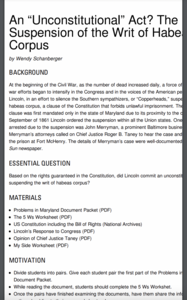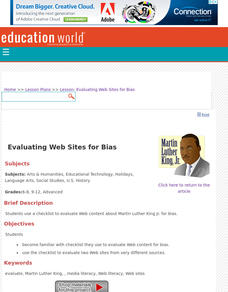Center for History Education
The Freedmen's Bureau: Success or Failure?
What is freedom? The United States grappled with the question at the end of the Civil War after four million enslaved people were freed. Using circulars and images from the Reconstruction period, individuals examine how successful the...
Curated OER
Priorities and Power: Migrants and Voting
Students examine the African-American migrants entry into the political process. They summarize their findings in a short essay.
Curated OER
Who's Who In Black History
Fourth graders examine the life and achievements of promident African-Americans. As a class, they participate in acting out various scenes of a play which represents the Civil Rights era. They discuss how the world might be different...
Curated OER
An Act of Courage, The Arrest Records of Rosa Parks
Students research accounts on Rosa Parks and look for differences between the modern form and an older report on Parks. They discuss why information about race and nationality are collected on these and other forms.
Teaching Tolerance
Jim Crow as a Form of Racialized Social Control
Just because slavery was illegal doesn't mean it went away ... Jim Crow Laws took its place. An eye-opening lesson focuses on how Jim Crow Laws were used as a form of racial social control against African Americans in the United States....
Facing History and Ourselves
Interracial Democracy
Radical Reconstruction, the 10-year period referred to after Congress passed the Reconstruction Act of 1867, saw the establishment of manhood suffrage, men voting without any racial qualifications. Southern states also rewrote their...
US House of Representatives
Black Americans in Congress Speak Their Mind
To conclude their study of Black Americans in Congress, groups select a statement made by one of the Members, examine the Member's profile on the provided link, and create a display that includes state represented, years of service, an...
Atlanta History Center
What if YOU Lived During Jim Crow?
Young historians envision what life was like for African Americans living in the Jim Crow South through hands-on, experiential activities.
PBS
The Sixties: Dylan Plugs in and Sells Out
Before Woodstock, there was Newport. Get plugged in to the social changes of the 1960s with a lesson that looks at Bob Dylan's performance at the 1965 Newport Folk Festival as a symbol of the radical changes that marked the era.
Curated OER
"The New Television Set" a Gateway to the Post World War II Era
Eleventh graders demonstrate their knowledge of the effects of television on the political, economic, religious, social, intellectual and artistic life of the US nation from the 1950's. Research how television shaped public opinion with...
Curated OER
An "Unconstitutional" Act? The Suspension of the Writ of Habeas Corpus
Young scholars explore the implications of habeas corpus. In this Civil War lesson, students analyze the writ of habeas corpus by Lincoln during the war. Young scholars examine primary sources from Lincoln and Chief Justice Taney....
Curated OER
Evaluating Web Sites for Bias
Students become familiar with checklist they use to evaluate Web content for bias. They use the checklist to evaluate two Web sites from very different sources.
Curated OER
Why Was It Difficult To "reconstruct the South"?
Learners examine problems faced by the states of the Confederacy following the Civil war. They predict how Lincoln wanted to handle the problem of reconstruction by listening to his words. They describe conditions in the South...
Curated OER
Written Report How Music Motivates
Young scholars examine the role of music in their lives. They listen to songs from the Civil Rights movement. They explain how music effects their thinking.
Curated OER
Defining Moments From the Past: Japanese American Internment
Learners conduct a mock Congressional Hearing to decide whether or not Japanese Americans who were sent to internment camps during World War II should be provided financial restitution. They research and create a time line of events...
C-SPAN
14th Amendment Equal Protection Clause
Two Supreme Court cases, Plessy v. Ferguson and Brown v. Board of Education take center stage in a lesson about the Equal Protection Clause of the 14th Amendment. Class members research both cases to compare and contrast the rulings.
Curated OER
Unionism versus Secessionism in Virginia
Eleventh graders, in groups, analyze newspaper articles and then debate and discuss if Virginia should succeed from the Union or not.
Curated OER
Diverse Voices - African American Ventures
Students research African American history and the Underground Railroad. In this African American history lesson, students discuss the Drinking Gourd. Students read 'If You Traveled the Underground Railroad' and discuss. Students work in...
Curated OER
Jackie Steals Home
Students read articles relating to Jackie Robinson's breaking of the racial barrier in professional baseball. This leads to a deeper exploration of racism in the United States. They use a variety of worksheets imbedded in this plan to...
Curated OER
Abraham Lincoln and Reconstruction
Students study Presidential Reconstruction during the Civil War years. They examine the role of the Executive Branch of government, especially in wartime. They investigate the complex issues of how Congress took on the role of...
Curated OER
"Jazz is About Collaboration": Jim Crow Laws And Segregation
Students explore development of jazz music in the 1930s by forming imaginary jazz bands which tour several cities in Depression-era America. Jazz band members create imaginary identities for themselves, develop publicity for their tour,...
Curated OER
Fallen Angels
Students read the novel, Fallen Angels, and examine the theme of coming of age during the Vietnam War. They create timelines of the 1960s, highlighting important issues of the era. They write research papers focusing on one particular...
Curated OER
Sojourner Truth
Students research Sojourner Truth. In this African-American history lesson, students read the speech "Ain't I A Woman?" and brainstorm descriptive words that describe Sojourner Truth. Students discuss why her acts were considered...
PBS
African American History: Climbing the Wall
Imagine the challenge of trying to trace your family genealogy if no records were kept of births and deaths. Where would you look for information? What types of documents could provide you with the information you seek? History...

























